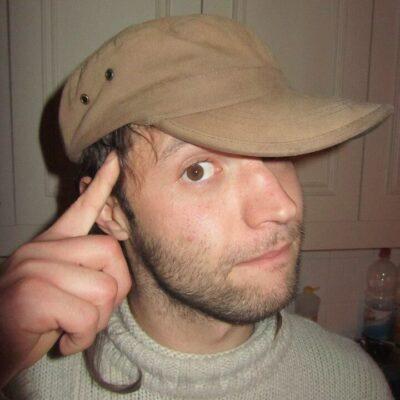An owl’s persistent, mellow and melodious hooting preceded the alarm and aroused us before the crack of dawn. We snoozed on while the twilight infiltrated the tent and replaced the absolute darkness. When we could see enough, we got up and began preparing for the first day of our trekking adventure.
The aptly named Lebanon Mountain Trail is a 470 km long-distance hiking trail that spans the entire territory of Lebanon from north to south. Divided into 27 sections, it proceeds through some of the country’s most stunning landscapes and notable cultural sites. We had just met its midpoint, and our plan was to follow it northward for as long as we felt like.
We were in no rush and lingered over coffee before packing. The handsome green apples were a tempting, moist complement to our typical bush breakfast consisting of dry fruit, nuts, and dark chocolate, but we chose not to touch them because that would technically be stealing. As the first direct sunlight began penetrating the foliages, we shouldered our bags and left the orchard.
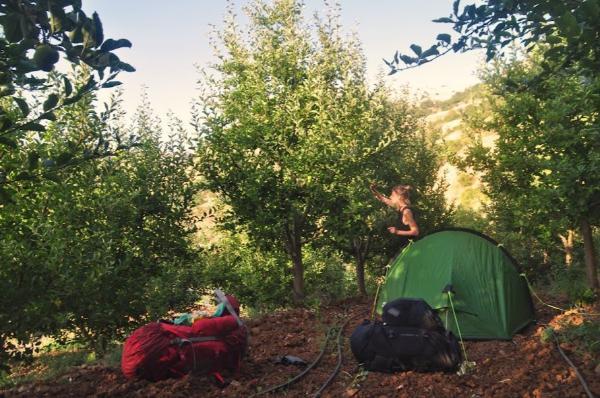
This story is an excerpt from my book "Backpacking Lebanon", wherein I recount my one-month journey around this fascinating country. Check it out if you like what you're reading.
Walking down the dirt road, we noticed that we’d camped near a bunch of Syrian refugee families. We’d be encountering them regularly from now on, dwelling in make-do, UN-logoed tents and drudging in the locals’ farms. Across a gully, we began ascending through the grounds of a hydroelectric station and toward the unpronounceable, hill-top village of Bqaatouta.
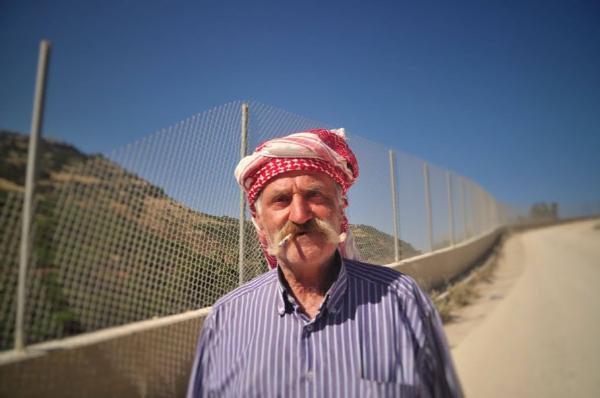
There was nothing too special over there. We only stopped for provisions at the village’s sole grocery store, exchanged some friendly words and glances with the scanty locals, and carried on down the other side of the hill.
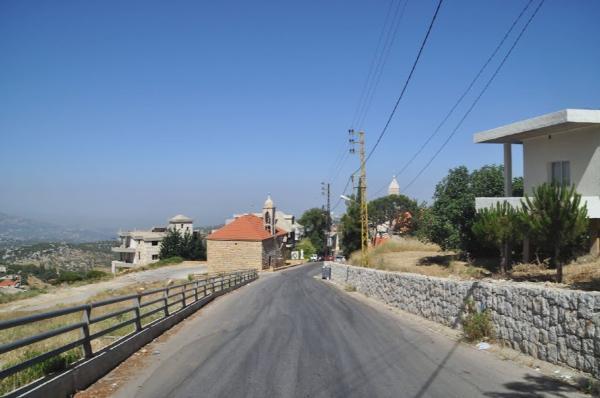
After a stretch of asphalt, we found ourselves on a lovely path ascending the next hill. It was steep but shaded by soaring, gnarled pines. It led us to Qalaat Faqra: a remote archeological site featuring Roman and Byzantine ruins.
The heat was peaking then. It was time to settle under some tree for lunch and rest until it receded. There was an idyllic spot on turfy ground under a thick oak umbrage beside an imposing ancient colonnade. But as we made for it jibber-jabbering, we drew the attention of the custodian. He informed us we had to pay an entry fee. It wasn’t expensive, but since the site wasn’t extensive and was visible from all around, we opted out.
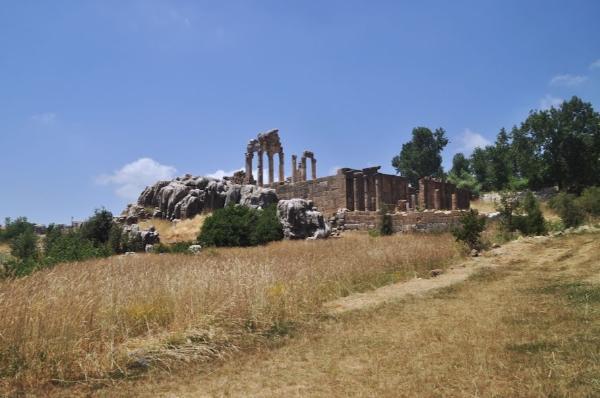
Instead, we sat together with him outside of his cabin/ticket booth/honey shop by the entrance. We appreciated each other’s company and had an interesting chat in our limited French. He was keen to sell us some of his homemade honey, which he claimed worked miracles on health and longevity.
He further advanced his point when a man looking forty-five stopped by with a woman looking thirty and bought four honey jars. After they left, our beekeeper/custodian friend told us that the man was sixty and visited him biweekly to procure his life elixir of honey, each time with a new young female companion. I don’t know to what extent the honey contributed to the chap’s vitality, but I corroborated the other part of the allegation when, some weeks later, I bumped into him again, strolling in a beach resort town together with a new escort. Anyhow, I’d love to buy some—it’d be delicious if nothing else—but I know from experience that, no matter how tightly I seal it, honey will always seep all over my backpack.
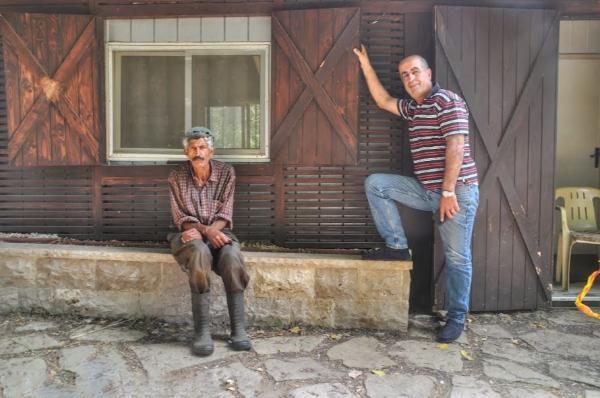
In the less sweltering afternoon, we resumed our way. Round the first hill, bathed in sweet late light appeared the town of Faraya, stretched thin across the broad valley below. A gigantic statue of a local saint adjoined by a 3D lettering of its name atop the dominant hill testified to the town’s importance.
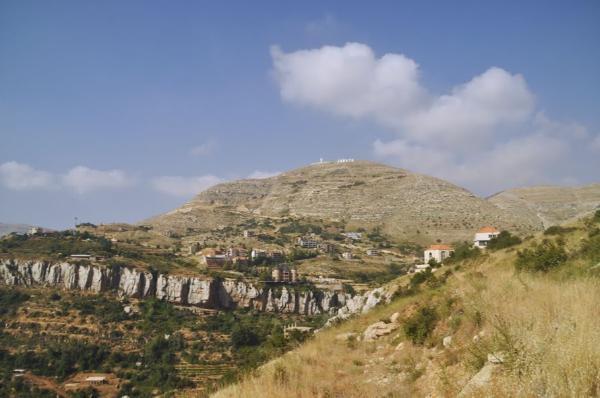
The trail pushed through nose-tall grasses and thorny thickets, over a falling-apart concrete irrigation bridge, and brought us to the main road between Faraya and Kfardebian: Faraya’s upslope extension. Where the road spanned the ravine, there was a spring.
This is where we had intended to camp, but the location differed somewhat from my idealized imagination of it. For one, the spring seemed the principal source of potable water for both towns, with an endless flow of cars stopping and people queuing to fill containers. Worse, the only even and unfenced ground around was the road.
After our turn to fill our bottles came, and as we were perching on the ledge hydrating and contemplating whether to jump the fence into the yard of the adjacent abandoned building, Emilio showed up: a young man on a tiny scooter with a huge canister between his legs.
He spoke excellent English, and we had an easy chat while he waited for his turn at the spring. His family owned a hotel some way up the road, and he proposed to show us to a better camping spot near there. We followed him on foot as his overloaded bike struggled uphill at a speed slightly greater than ours.
He led us through the bush to a dry, smooth-rock stream bed above a vertical cliff where a waterfall would be dropping in the winter. The only downside was that we couldn’t peg the tent on the solid ground—having to fasten and stretch it with heavy stones instead—but it offered privacy and a fantastic view. It became our home for this night.
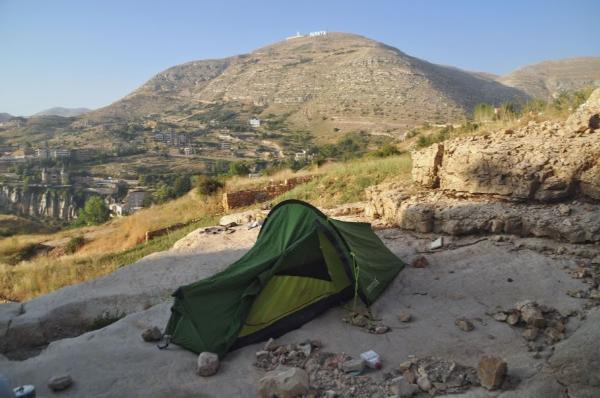
Photos
View (and if you want use) all my photographs from Baskinta, Faqra Temple, and Faraya.
Accommodation and Activities in Lebanon
Affiliation disclosure: By purchasing goods or services via the links contained in this post, I may be earning a small commission from the seller's profit, without you being charged any extra penny. You will be thus greatly helping me to maintain and keep enriching this website. Thanks!
Stay22 is a handy tool that lets you search for and compare stays and experiences across multiple platforms on the same neat, interactive map. Hover over the listings to see the details. Click on the top-right settings icon to adjust your preferences; switch between hotels, experiences, or restaurants; and activate clever map overlays displaying information like transit lines or concentrations of sights. Click on the Show List button for the listings to appear in a list format. Booking via this map, I will be earning a small cut of the platform's profit without you being charged any extra penny. You will be thus greatly helping me to maintain and keep enriching this website. Thanks!
